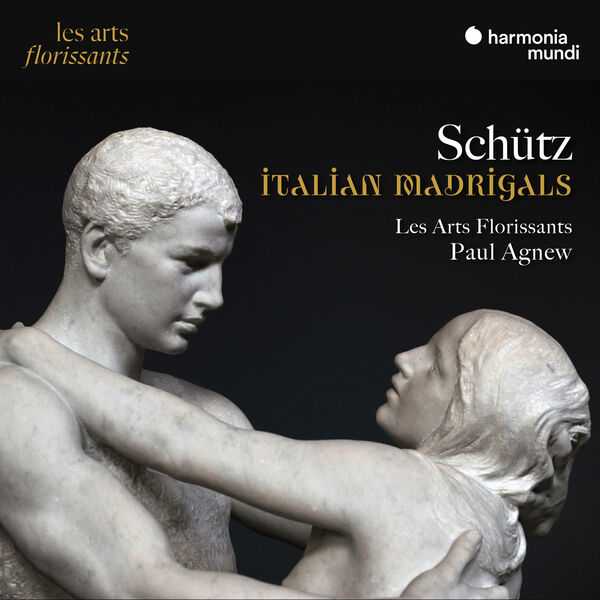

Composer: Heinrich Schütz
Performer: Les Arts Florissants
Conductor: Paul Agnew
Format: FLAC (tracks)
Label: Harmonia Mundi
Catalogue: HAF8905374
Release: 2023
Size: 1 GB
Recovery: +3%
Scan: yes
Il primo libro de madrigali, Op. 1, SWV 1-19
01. O primavera, SWV 1
02. O dolcezze amarissime, SWV 2
03. Selve beate, SWV 3
04. Alma afflitta, SWV 4
05. Così morir debb’io, SWV 5
06. D’orrida selce alpina, SWV 6
07. Ride la primavera, SWV 7
08. Fuggi, fuggi, o mio core, SWV 8
09. Feritevi ferite, SWV 9
10. Fiamma ch’allaccia, SWV 10
11. Quella damma son io, SWV 11
12. Mi saluta costei, SWV 12
13. Io moro, ecco ch’io moro, SWV 13
14. Sospir, che del bel petto, SWV 14
15. Dunque addio, care selve, SWV 15
16. Tornate, o cari baci, SWV 16
17. Di marmo siete voi, SWV 17
18. Giunto è pur Lidia, SWV 18
19. Vasto mar, SWV 19
1611: After two years of study with Gabrieli in Venice, Heinrich Schütz tried his hand at composing madrigals on Italian poems.
This mere ‘graduation exercise’ turned out to be a masterpiece: the young German composer demonstrated his ability to identify each nuance of the text with a different musical emotion, a refinement heightened here by the interpretation of Les Arts Florissants.
This 2023 release is way outside the usual zone for the ensemble Les Arts Florissants and director Paul Agnew, who have specialized largely in the French Baroque. The booklet even lists an Italian language coach, but it is quite worthwhile, for these Italian-language madrigals by Schütz are sparsely recorded. They were published in 1611 while Schütz was studying in Venice with Giovanni Gabrieli, and they reflect his mastery of the polyphonic Italian madrigal style. There are some splashes of chromaticism, but nothing resembling the music of Gesualdo, Marenzio, or the other late Italian madrigalists. Instead, the model is the early madrigal books of Monteverdi, which would have been very much in the air while Schütz was there. The music reflects the texts in great detail, which was one of the straws in the wind pointing toward the emergent operatic styles, and there is a certain dramatic quality that seems to prefigure the mature Schütz. This is captured well by Les Arts Florissants, essentially opera specialists, and while there is a feel suggesting that the musicians are coming to this tradition from the outside, the performances hold the listener’s attention. The Philharmonie in Paris is not really the right venue for this music and gives it a remote sound, but this is, nonetheless, a valuable addition to the Schütz discography.